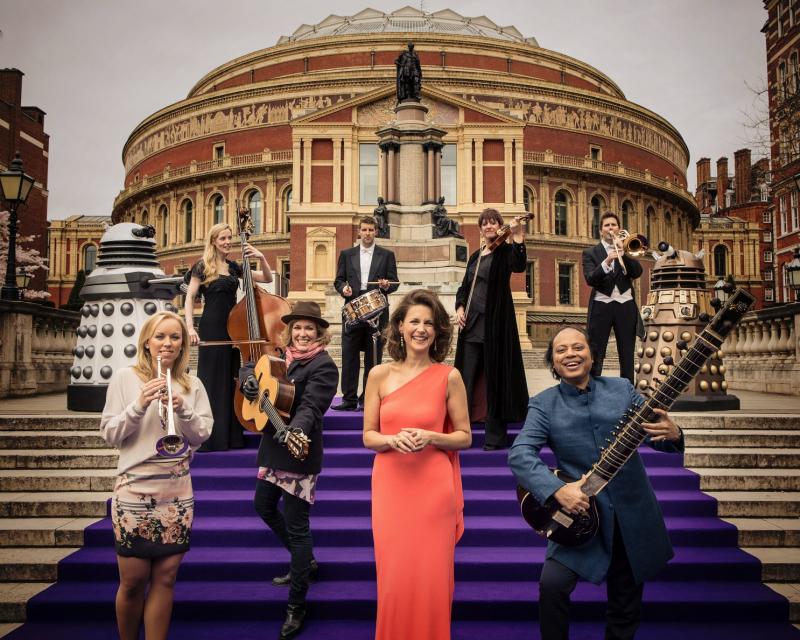BBC Proms 2013: Ring operas for a fiver each | reviews, news & interviews
BBC Proms 2013: Ring operas for a fiver each
BBC Proms 2013: Ring operas for a fiver each
The world's biggest music festival runs the gamut as ever, from Bach to Fazer, England to Azerbaijan

First, the good news: you can see Wagner’s entire Ring at the Royal Albert Hall, with absolutely the world’s finest Wagner singers and conductor in concert, for a grand total of £20. The bad news is that unless you have a season ticket – in which case it works out even cheaper – you’ll probably have to queue for most of the day to guarantee a place in the Arena or Gallery, and then you’ll still need the energy to stand for up to five hours an evening.
None of that will deter devoted Prommers, whose numbers swell and grow younger every season. Little wonder, with the price of £5 a ticket held for the last eight years. And of course it’s all absolutely free, once you’ve paid your licence fee, on Radio 3. The world’s biggest music festival, as it can call itself without exaggeration, increases its outreach, its links with television, the sheer inclusive range of music, though the essential format remains the same: two months of concerts running this year from Friday 12 July to Saturday 7 September.
 The three big anniversaries are the core of the programming, though while Wagner gets seven operas, Verdi is limited to bits and pieces – interesting ones, all the same, in the concert given by Antonio Pappano and his Italian forces of the Accademia di Santa Cecilia, Rome. Britten appears in British context, with the BBC continuing to stake the claims of recently-overshadowed Tippett – so The Midsummer Marriage will stand alongside Billy Budd (Jacques Imbrailo in the Glyndebourne production pictured right by Alastair Muir) - and plenty of lesser luminaries getting a look-in. Some of us may find the inclusion of so much Granville Bantock – "poor old Gran" as near-contemporary Elgar called him – a little weird, but Proms Director Roger Wright says they’re making no special claims. Go, try it, decide for yourselves.
The three big anniversaries are the core of the programming, though while Wagner gets seven operas, Verdi is limited to bits and pieces – interesting ones, all the same, in the concert given by Antonio Pappano and his Italian forces of the Accademia di Santa Cecilia, Rome. Britten appears in British context, with the BBC continuing to stake the claims of recently-overshadowed Tippett – so The Midsummer Marriage will stand alongside Billy Budd (Jacques Imbrailo in the Glyndebourne production pictured right by Alastair Muir) - and plenty of lesser luminaries getting a look-in. Some of us may find the inclusion of so much Granville Bantock – "poor old Gran" as near-contemporary Elgar called him – a little weird, but Proms Director Roger Wright says they’re making no special claims. Go, try it, decide for yourselves.
Indeed, it often comes about through conductor interest. Fabulous Finn Sakari Oramo, taking over the reins of the BBC Symphony Orchestra this coming season on the strength of a single superlative concert, requested to perform Bantock’s Celtic Symphony – it had better be less laughable than his Hebridean Symphony – and Vladimir Jurowski staked a claim for The Witch of Atlas. Oramo conducts the first night; the last is headed by Marin Alsop (pictured below by Chris Christodoulou at last year's Proms), simply because she's one of the liveliest motivator-conductors around and not because she's a woman, but much will be made of that particular "first".
New British works are as well represented as ever, with Sir Harrison Birtwistle’s lepidopteral incantation for small forces The Moth Requiem and Mark-Anthony Turnage's Frieze more enticing - for me, at any rate - than Thomas Adès’s Totentanz (though that has compelling artists in mezzo Christianne Stotijn and baritone Simon Keenlyside). Glitzy visitors are fewer than usual; apart from the Wagnerian Germans and the Verdian Italians, the standouts are Mariss Jansons with the Bavarian Radio Symphony Orchestra and Lorin Maazel with the Vienna Philharmonic. Their Bruckner Eight is to be prefaced by Bach from the organist of Bruckner’s home town, leading Wright to quip in his welcome speech, to universal groans, that the suggestion of having the organ pieces after the symphony would have created "after eight Linz".

You can’t fault the breadth, though. The Late Night Proms are for me what makes this a real festival: there are thirteen of these, featuring performers from Nigel Kennedy to America’s a cappella group Naturally 7. Wright suggested to Simon Broughton that we’ve stopped talking about "world music" and are much more inclined to "international classical": hence consummate artists from Azerbaijan, India and Mali. There are the Proms’ first ever concert of Gospel music – another late nighter – an appearance from The Stranglers and, yes, the return of the Doctor Who Prom. Don’t groan: there’s room for all. Everything must change in order that everything can stay the same.
Share this article
The future of Arts Journalism
You can stop theartsdesk.com closing!
We urgently need financing to survive. Our fundraising drive has thus far raised £33,000 but we need to reach £100,000 or we will be forced to close. Please contribute here: https://gofund.me/c3f6033d
And if you can forward this information to anyone who might assist, we’d be grateful.

Subscribe to theartsdesk.com
Thank you for continuing to read our work on theartsdesk.com. For unlimited access to every article in its entirety, including our archive of more than 15,000 pieces, we're asking for £5 per month or £40 per year. We feel it's a very good deal, and hope you do too.
To take a subscription now simply click here.
And if you're looking for that extra gift for a friend or family member, why not treat them to a theartsdesk.com gift subscription?

Add comment